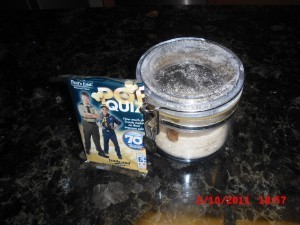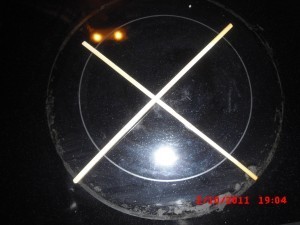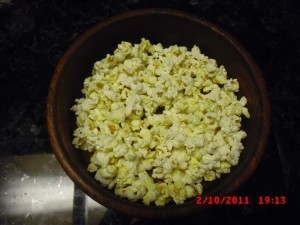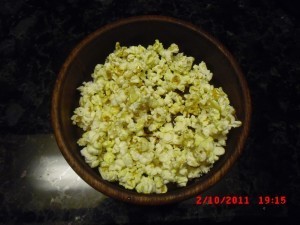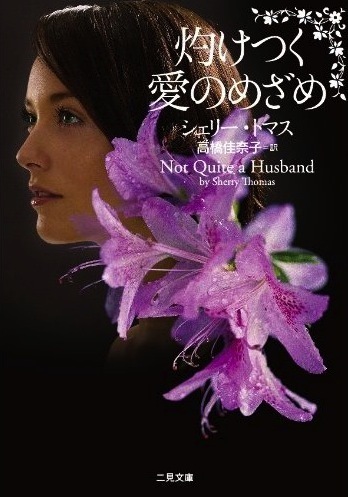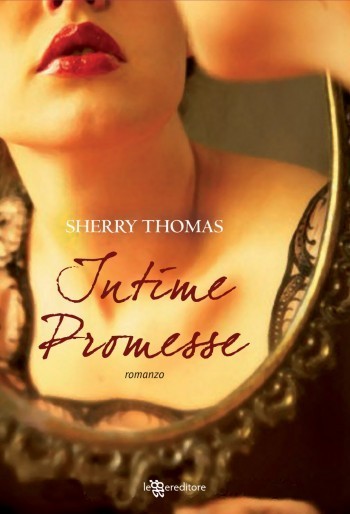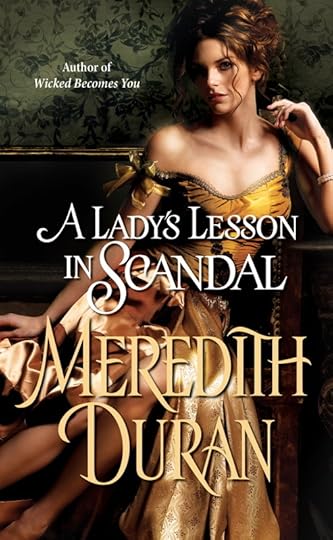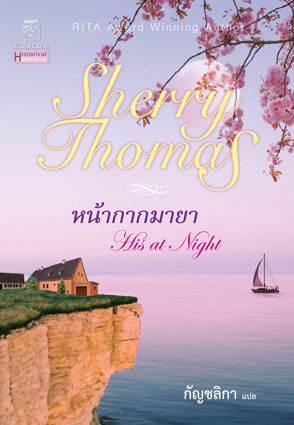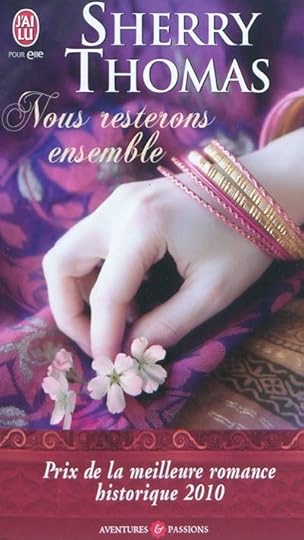Sherry Thomas's Blog, page 4
June 17, 2011
On E-reading
Last night, unable to sleep, I went looking for books at the library and then, when I failed to find anything of interest, bought a few from a bookstore. That I did this at two in the morning only struck me as wondrous about an hour into reading the book that finally grabbed my interest (Flapper, by Joshua Zeitz, and it's awesome, if you too have been bitten by the 1920s bug).
Insomnia leads to rumination, so as I lay on the couch, my pondering of the thrill of instant gratification yielded to memories of other kinds of gratification. I believe it was Remembrance, by Jude Devereaux, that was my first hardcover purchase. (Can this be right?) It was 1994; I was fourteen years old and I had a bit of a cash flow problem, as fourteen year olds generally do, and I babysat with the specific intention of saving up for the momentous event of this book's release. It seems to me, in my dim recollection, that this was the first book Devereaux had published in (what seemed to my fourteen year old self, at any rate) a very long time. I had planned ahead for it, carefully lining up income opportunities, and informing my parents, very seriously, that they would need to deliver me to the bookstore at 11AM (opening time) The Day Of. And because my parents are awesome, they did exactly that.
I walked out with that hardcover feeling so high, so triumphant, that I can still recall the walk with perfect clarity.
I had many such experiences in years following. Once I discovered AAR, their "Upcoming Releases" page became my first stop on the internet on those occasions when I mustered to the computer lab in my dorm to experiment with this thing called "The World Wide Web." I had a little notebook in which I kept a list of books, sorted by date, that I needed to save for and buy. And oh, the anxiety of going into the bookstore, not knowing if the book would be there, if it had sold out already, if I was going to have to hop the subway (for I was in NYC by this time) to make the forty-five minute trek downtown when I had class in two and a half hours but who cares because I really *needed* this book, ASAP.
And then, the library visits! Seriously, I collected library memberships by the bushel. Oakland, Berkeley, West Contra Costa, Alameda and San Francisco: none of you were safe, in the summers. At my boarding school, I was the only student I knew with a membership to the town's public library. At college, joining NYPL was my last stop of move-in day. In my head, I was an elite hunter, a sophisticated and merciless tracker of books; I entered these libraries like an assassin, intent on leaving no good book spared. I felt…ridiculously glamorous and self-important as I corralled the books that other library-goers had somehow, in their carelessness, missed or forgotten to check out. Again, my triumph, in exiting with a new release I'd had the unbelievable good luck to find on the shelf (no doubt two seconds after its return, or so I imagined) gave me the sort of giddy elation other people look for in shady drugs manufactured in basements.
For the most part, complaints about e-readers puzzle me. Don't get me wrong: I understand the peculiar, sensual appeal of paper. I like to dog-ear and underline. Being brutal to my books was how I showed them love. As a kid I was so jealous of friends who loved their stuffed animals enough to wear away eyes and noses; I could never invest the time; feeling bad for my animals' clear signs of neglect, I'd rub them over the gritty surface of the sidewalk to manufacture signs of wear and tear. But my books? Those required no extra treatment. Row upon row, shelf upon shelf, their spines were cracked, their pages bent, their covers creased, and I was proud of that. My friends whose books looked untouched roused my silent suspicion when they claimed to love to read.
In other words, I get the longing for paper. I understand intimately the pleasures of a physical interaction that registers one's involvement with words.
But that alone is not enough to diminish my love of the miracle that is e-readers. Last summer, marooned at 12,000 feet above sea level, much nearer to the equator than my sunblock was apparently designed to handle, and much farther from English-language bookstores than I could like, I nevertheless read a book every thirty-six hours, thanks to the Sony Pocket Reader I'd stuffed to the gills before leaving home. To risk a really vulgar and possibly offensive analogy, for which I hope you'll pardon me: my e-reader felt to me much as I imagine a stocked liquor cabinet feels to someone who's developing a drinking problem: I felt safer, more comfortable, somehow *settled* in myself, knowing that I had a good supply of books to see me through my Peruvian summer. But I also felt anxious, uneasy, to know I had so many, many books available at the touch of a button. And in the course of the summer I came to understand this curious anxiety a little bit better, because I found that for me, e-reading is a very different game than reading in paper—and here is where my ambivalence about e-reading truly lies.
For a book addict, once the thrill of the hunt is removed, once the chase is no longer required, the experience of reading changes, somehow.
I find myself skipping from book to book like a madwoman.
I find myself ripping through the electronic pages at a pace that leaves me feeling at once glutted and vaguely nauseated.
I find my greed expanding exponentially, with no obstacles to regulate it.
And, of course, I find that I miss the signs and tokens—the bent pages, the cracked spine—that visually register the interior journey I took through a story.
My e-reader is my personal Xanax for travel: if I know I never will be without a book, I have no doubts about my journey. For the same reason, it also comforts me on sleepless nights. But I confess: I miss the chase. I miss the thrill of victory when books seemed objects that required careful planning, strategizing, and even a bit of luck to obtain. And I miss, above all, what I might call…the *friction* of paper books.
I mistrust myself with my e-reader. In its thrall, I'm becoming a different sort of reader. Sometimes, now, when I have a paper version in my hands, I forget to dog-ear.
This is useless romanticism. I'll never give up my e-reader, and clinging to it does not mean that I must stop reading paper or that paper is dying. But such are the thoughts born of a sleepless night.
June 13, 2011
Two Weeks To Go Before RWA Nationals
Where did the time go? Granted, RWA hits a month earlier this year, but still, wow. Time to start packing.
I'm happy to report that Book 1 & 2 of the new trilogy have both been delivered to my new editor at Berkley. On time. The books are not bad, by the standards of my first drafts. But still, I'm already thinking of improvements, connections, and deeper layerings to add to them, when they come back from my editor. Now onto the updates.
1) Three-Chapter Critique from Yours Truly
On the 13th of June my Crit for Water critique goes up for auction here. If you need three chapters looked at, by all means bid. It's an excellent cause and I am a terrific critiquer. (You didn't expect me to say anything else on the eve of the auction, did you?  )
)
And Mary Baader Kaley at Not an Editor was kind enough to interview me about my approach to critiquing. But basically, I'm a good fit for you if you really need your work looked at by a pair of fresh eyes and you actually want to know what's not working. I will tell you what's working for me too, but I assume that you, like me, are more interested in what can be improved than what cannot be.
2) Don't Judge a Girl by Her Face
I participated in a multi-author fun vid a while ago. And here's the result of it.
Each author does her own recording. I recorded myself with the Photo Booth app on my MacBook–and immediately realized what TV/movie folks are constantly talking about lighting and makeup. My first go around I looked a combination of malnourished and zombielike. So I threw on everything in my make-up bag–very liberally, since we are not dealing with high-def cameras here–and then pushed a really strong lamp right into my face. You see me sitting on a couch, what you don't see–and which made Sr. Kidlet lose his @#$% laughing–was all the chairs and stools and everything that held my laptop and my lighting at the correct height and angles!
So this time I looked alive and well-fed, but because I almost never, ever see myself in motion, I realized, for the first time in my life, after watching the footage, that I have a come-hither face. What to do?
I recorded for a third time, this time with my dress on backward. Yep, that's what you see in the video, that very prim neckline, that's actually the back of my house dress. The front is not exactly plunging, but I figured, if I already have a come-hither face, then I'd best keep everything else covered. :-)
3) Now For Something Slightly More Intellectual
I had the great pleasure to be interviewed by Ms. Courtney Verronneau, a sociology student at the University of Oregon, for her final thesis on gender relations in romance novels. She asked some wonderfully thought-provoking questions, which required me to actually organize my thoughts. I post the interview here with her permission.
1. Together with her profession, her more collected and self-assured personality, and her quiet confidence, Bryony is quite different from other heroines in romance novels. Why did you decide to create her character and how would you compare her to other heroines in yours and other authors books?
The origin of NOT QUITE A HUSBAND lies in the 2006 film adaptation of THE PAINTED VEIL. I'd never read the original book, so I went into the movie not knowing the story. When I came out, I felt I'd been hit by a truck. I couldn't believe the hero died! It was gut-wrenching.
Almost immediately I know I'd have to write a similar story of reconciliation, but give the leads the happy ending they deserve, rather than only a fleeting happy moment. But I never want to just rewrite another story; it has to be different enough. And one of the easiest things to do in terms of finding new angles to approach a story is to flip the genders.
In THE PAINTED VEIL, the hero is a bacteriologist, serious and bookish. So in my book, Bryony is a physician, serious and if not bookish, rather unapproachable.
I've heard a saying that in movies, if you want to have a memorable female lead, write the part for a man then find a woman to play it. And ALIEN, with Sigourney Weaver, is often given as an example, a part originally written for a man. By this, I interpret the meaning not as men are more memorable than women, but that Hollywood is such a male-driven, male-dominated industry that roles for women are often relegated to those of girlfriends and mothers etc., and that a full-fledged female character, who is not a supporting character in someone else's story, but a hero of her own, is awfully hard to come by. (We are excluding rom coms here, of course.)
So if Bryony is different from other characters, both my own and many other romance heroines, that maybe part of it. That she had her origin in a male character and does not possess any desire to please–one of the most prominent feminine characteristics in fiction and possibly in life. That she will thoroughly cut someone out of her life if s/he has disappointed her. That she finds it so difficult, if not impossible, to forgive any transgressions.
2. A common theme I have run into in romance novels is the heroine loving the hero since childhood and the hero finally returning her love in adulthood. But "Not Quite A husband" reversed these roles, having the heroine be the focus of the hero's admiration since he was a small boy. Furthermore, Leo is not portrayed as stereotypical or hyper-masculine: in the story we read of his physical distress, gauntness, and exhaustion after traveling and malaria, and find him dependent on Bryony during his sickness and the uprising in Chakdarra. What about Leo to you makes him stand out from other romantic heros and how, if at all, does he contribute to a new definition of masculinity?
I have always felt hyper-masculinity to be strange. I wonder if its recent resurgence–or perhaps it never went anywhere, since we did have a whole lot of it in the Old Skool romances–is a subconscious reaction to the man-children we see so often in popular culture. I mean, look at the comedies of the past decade, they are all about immature men who are forty-year-old adolescents. But hyper-masculinity, if you to mean mad-alphaness, my-way-or-the-highway-ness, is as cartoonish and repellent as 40yo adolescents. And if your definition of hyper-masculinity is physical, like the Black Dagger Brotherhood heroes who are of a jaw-dropping size and have shoes bigger than my garbage can, ur, I guess they are just unrealistic in a historical era. Plus, all men get sick, at some point, don't they? :-)
As for Leo, he has that one thing I feel that separates real men both from adolescents and from cave men alphas: he is secure in himself. And because he is, he does not need to force his will on anyone else. And because he is, he learns from his mistakes–once he sees those mistakes. He does not get defensive or angry when it is pointed out that he'd done something wrong; instead, he repents and makes amends.
So it is a character issue, masculinity, and not so much physicality or mannerism.
(BTW, I hold my heroines to the exact same standard. They have to eat crow if they did something wrong and show changes in behavior before I deem them to be again trustworthy. Some readers have felt that Camden in my book PRIVATE ARRANGEMENTS is an unforgiving bastard. But the issue for me has always been, has Gigi realized yet she did something fundamentally wrong, or is she still only sorry that she got caught and lost him?)
3. On page 118 of the book, when Leo is reflecting on their failed marriage he thinks to himself that he believed he could break through "The Castle" by making love to Bryony, but that "instead she banished him altogether. They grew further and further apart. And their marriage dissolved like a pearl in vinegar." At face value it seems that their marriage fell apart because they weren't having sex. Do you believe this was the main reason the marriage didn't work, or was is it a side effect of a larger issue?
It is very much not the cause, but the effect of the secret that was eating away at their marriage from inside out. They had plenty of good sex–lol, with her dreaming through part of it–so it's not an issue of frigidity, but an issue of trust. She could not trust him. She could not forgive him. She could not stand him, in a way, even as she desperately wanted him and desperately wanted everything to be right again.
4. Many feminists like Andrew Dworkin and Catherine McKinnon view sex as the ultimate form of male domination over women, while feminist Camille Paglia argues that female sexuality as the source of our power. How much do the themes of domination and power affect sex? Do you think Bryony's sexuality makes her powerful? And do you believe there is more to self-empowerment then just female sexuality, if so, what about Bryony and other romance novel heroines makes them powerful?
Um, whatever happened to sex just being mutually enjoyable? :-)
I definitely think of the entire female reproductive system as an asset, both because men can't get enough of it and because it is just biologically useful. Where else are you going to turn if you want a baby? If not your own womb, then someone else's. :-) But all this talk about empowerment via sexuality, I'm not sure how to interpret it.
Chairman Mao had a saying, "Political power comes from economic power." Which is quite astute, if you think about it. I think, in observing the world, I can say sexual power comes from economic/political power. Certainly women find rich/powerful men more attractive because of it. And throughout most of history, those women who practiced their sexual powers most assiduously were often not after sex, but economic/political power.
While I am a flinty-eyed realist, I very much believe that sexual power is not a long-lived power. Because sexual power is dependent upon infatuation, and infatuation is a short-lived state. Which is fine is you are just using a man as a stepping stone to a man even higher up the foodchain. For there to be a happy long-term relationship, there has to be more substance.
Bryony has that substance–even though she is emotionally stunted, in a way, she brings to the table a great competence. She makes a difference in people's lives. She is admirable.
And what makes her powerful in this book is that she is not willing to sweep Leo's sins under the rug. That if he wants her love–and access to her body–he has to earn it. That she values herself too much to be swayed by just good sex.
(Sorry for the rambling answer. The question is so big!)
5. Do you think your characters Leo and Bryony challenge traditional gender roles? Why or why not? How do they challenge these roles both inside and outside the relationship?
They do challenge traditional gender roles, if we see traditional gender roles as the female as the nurturer and breeder. Leo is definitely the nurturer. And Bryony is no breeder. :-)
But then traditional gender roles are so limiting, aren't they? Life is much more nuanced and complex. My heroes, who are very secure in their mindset, do not find women with achievements of their own threatening. They admire these achievements. They think of their women as individuals, and not just as walking vaginas/ovaries. This may make them unusual, but such men have existed all throughout history and hopefully today more than ever.
And my heroines are unapologetic about interests they have outside the hearth and the home. Certainly there were many such women by the end of the 19th century and I'd like to think countless today. By this I do not mean they repudiate hearth and home–Lord knows I love mine–but just that they are very comfortable with the idea that is not where their identity begins and ends.
And Leo, if you look at him, is very much a man's man. He is comfortable taking charge. He is just as comfortable yielding the control of the situation to someone who knows better–he is not about to stitch his own wound when Bryony can do it so much better. And yet she cannot persuade him to deviate from a course he believes to be right, i.e., taking part in the defense of the fort at Chakdarra, despite the danger and his injuries.
Never let it be said we don't live up to our intellectual potential on this blog. (Actually it could be said, but lol, maybe not today.)
May 14, 2011
How to Make Caramel Popcorn–and General Update
The senior kidlet, who is a gourmet, has written a recipe post for the blog. And lo and behold, he sounds exactly like the smart-aleck fourteen-year-old he is.  And he also sounds like he is talking to a bunch of other teenagers, rather than to ladies of his mother's generation. But oh well. I have some general update following the recipe.
And he also sounds like he is talking to a bunch of other teenagers, rather than to ladies of his mother's generation. But oh well. I have some general update following the recipe.
And if you need a query consultation, I have one up for bit at the Brenda Novak Diabetes Research Auction.
Caramel Popcorn
Hi I'm John a.k.a the senior kidlet. First off, this blog is pretty cool. Do i sound immature? Never mind. If you don't already know I've been on a cooking spree for a while now. Most of the time I make slightly more complicated dishes than caramel popcorn but I just had to share this one because it's just so delicious, easy to make and not expensive either. This is great food for any sports event on TV, a movie you rented and brought home, or just a quick snack. Do you really want to know this recipe? I bet you do, you wanna know how I know it's cause I'm a psychic. Not. All right, on to the recipe.
Acquire a bag of popcorn and about 1/3 cup of sugar. You can use more or less sugar and you can pop your own corn rather than a bag if you please.
Get a small pot
Put in the same amount of water as sugar in the pot.
Add the sugar.
Find yourself something to stir the mixture with. The chopsticks of Fire Flash are my choice but anything will do.
Stir! Stir you scurvy dogs!
Turn the heat up to High and stir until sugar is dissolved. You should probably put the popcorn bag in microwave now but if you're making it in a kettle you should start a little earlier.
Put the popcorn in a big bowl and keep it nearby.
This is what it looks like before turning into caramel. I usually pour it in now because it's much easier to pour and I think it tastes better as well.
Make sure that you stir it together and make sure nothing is sticking at the bottom
This is what it looks like in the end. Yeah not much but I assure you in the strictest confidence. It's good.
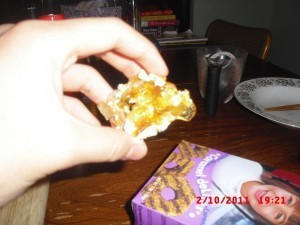 This is a piece that is (expletive deleted by Mom) loaded with caramel you can mix and match as you please.
This is a piece that is (expletive deleted by Mom) loaded with caramel you can mix and match as you please.
Just how good it is.
(Thank you, Sr. Kidlet, now back to Mom.)
General Update
I have finished the first book in the trilogy! Woot! It is very exciting–especially more so as the book hasn't given me anywhere as much trouble as HIS AT NIGHT did. I am full of cuddly feelings right now.
OK, so the truth is, the scaffolding is all done, but the plasterwork and the wiring and the interior decoration still leave much to be desired. So as I go full steam at Book 2–2.5 weeks to deadline and 30k words to go–I'll have to revise Book 1 as I go. But a good scaffolding has always been my greatest problem in the past, so I am happy to have that out of the way.
The Harlequin title for Book 2, btw, is EIGHT YEARS AS A VIRGIN BRIDE–AND HOW IT ALL ENDED. :-)
(There are no official titles for any of them yet. Will be hashed out during cover meetings, which are to take place soon at Berkley, from what I understand.)
And of course, what is a general update post without a couple of foreign covers?
Portuguese PRIVATE ARRANGEMENTS, the title of which translates into AN ALMOST PERFECT LOVE.
Japanese NOT QUITE A HUSBAND, which they call AWAKENING OF LOVE BURNING. Me like. :-)
And don't forget that Meredith's new book will be out in soon. The excerpt is on her website. I have the link to it in the sidebar. Read and love. In the meanwhile, I return to work and will–I devoutly hope–post the next update after both Books 1 & 2 have been turned in at the beginning of June. Keep well and happy reading.
March 29, 2011
Guilt-blogging
It seems rather neglectful–not that we don't tell you upfront that we are neglectful bloggers here –to comment upon an event elsewhere but not here at my own blog, especially since the event had something to do with me.
So here's my call story for this year's RITA nominations.
Usually I am not a nervous person, possibly because usually I have no idea what's going on.  Take the RITAs, for example, in 2009 and 2010, the calls came early in the morning, right after I'd come back home from walking the Junior Kidlet to school, before I'd even realized what date it was. This time, however, I began working before waking the kidlet up, and while using the dictionary widget on my macbook, I happened to glance at the calendar widget, and the 25 was highlighted. Too bad, a second later, I remembered that RITA calls went out on the 25th.
Take the RITAs, for example, in 2009 and 2010, the calls came early in the morning, right after I'd come back home from walking the Junior Kidlet to school, before I'd even realized what date it was. This time, however, I began working before waking the kidlet up, and while using the dictionary widget on my macbook, I happened to glance at the calendar widget, and the 25 was highlighted. Too bad, a second later, I remembered that RITA calls went out on the 25th.
This set me slight on edge. I am not a hoper–is that a word?–and usually prefer to first mentally prepare myself for the worst that can happen. And when 8:30 came and went, I thought, well, that's probably it. The calls have gone out and I didn't get mine.
Then at 8:37 the phone rang. I scrambled to get it. Ack. The number of a known telemarketer. I pressed the rejection button really hard and muttered something under my breath. And then, just as I was walking away from the phone, it rang again. And this time it was Cindy Kirk from RWA. There is an old Turkish proverb that goes: When Allah wants to make a poor man happy, He takes away the man's goat and then let him find it again. And boy, when I got the call after thinking I wouldn't, did it make me happy!
This was written for The Romance Bandits. Who corralled a bunch of RITA nominees (and a couple of Golden Heart nominees) who have been guest bloggers at the Bandits' blog to share their RITA call stories. Go give it a read. Most of the stories are better than mine.
But I was most certainly as thrilled as anyone. This never gets old. Especially as I'm always a little unsure how to feel about HIS AT NIGHT myself.
Now my mind turns to the dress. But alas, I'm on deadline. And I sit all day and eat crap when I'm on deadline. And even the prettiest dress might turn into sausage casing when the deadline goes on for another two months.
So I'd better finish those two books fast–two books, ack–if for nothing else than to get out the house and get some exercise. Book 1 is shaping up well. Book 2 is going to need an overhaul–nothing new here. Same old process. Write 'em first and sort 'em later.
This then, will be the last blog for a while, until I've turned those two books in. So I want to inform everyone that I am contributing critiques to two auctions. First, to the well-known Brenda Novak Diabetes Auction, a query critique. Second, a three-chapter critique to the Crits for Water Campaign run by blogger Flighty Temptress. My critique is scheduled to go up for auction on June 13. I'm not sure how the bidding works exactly, but if you are interested, I'm sure Flighty Temptress will be happy to walk you through the process. :-)
I have never offered a chapter-critique before, and the reason is that I can be terrifying. :-) Half the time I preface a critique with "I know you won't like hearing this–" But if you want someone to have a good hard look at your WIP, especially one that's close but no cigar (those actually benefit the most from a stone-cold analysis), and if you've a few bucks to contribute to a good cause, then look me up. Just make sure you really do want to know what's not working.
And now, last but never least, new foreign covers.
Italian Private Arrangements:
Now if this looks familiar, it is. 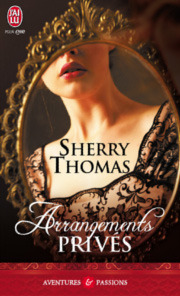
It's Monica Belucci all over again! Different photos from the same series. I really would like to know if my Italian publisher consulted the French cover or if this is just an amazing coincidence. :-)
And now, Taiwanese NOT QUITE A HUSBAND.
This actually looks a lot like the environs of Chakdarra, where pitches battles of the Swat Valley Uprising of 1897 were fought. And the fort resembles the real fort at Chakdarra. Need I tell you that I'm happy? And lol, not only did they mention the RITA for NQAH, they also mentioned the AAR Best Hundred Romance placement. All true, let's sell this baby, I say. It's when they call me a New York Times bestselling author that I start to giggle. How come I'm always an American bestseller overseas? :-P
So long, keep well, and 'til we meet again.
January 28, 2011
My sister the secret rock star.
Necessary preface: this is a true story…and it just happened to me.
So, about eight weeks ago, my younger sister, Shelley, comes to me and says, "Hey, I wrote a book."
(You may recognize Shelley's name if you read The Duke of Shadows. The book is dedicated to her for good reason. She found the manuscript under a bed, where I'd abandoned it after numerous literary agents declined to represent it. Having read and liked the book, Shelley convinced me to try again. She is the reason that I'm now a published author.)
I'd always known Shelley was a talented writer and an avid reader, but I had no idea that she'd been writing fiction, much less novel-length fiction. So here's how our conversation went:
Me: "You've been writing? Hey, that's awesome! I always said you should give it a go."
My sister: "In fact, I've been writing for some time. This is my…oh, seventh manuscript?"
Me: "What?!?"
My sister: "Yeah, I enjoy it."
Me: "Um. Okay, that's awesome. A bit…secretive, but purely awesome all the same. So, what kind of book is it?"
My sister: "YA, set in the near future."
Me (thinking myself witty): "Hmm, let me guess: it's about a girl who meets and falls in love with a mysterious and slightly sadistic stranger in her chem/bio/gym class."
My sister: "Wrong all around. For one thing, the protagonist is a teenage guy."
Me: "A guy? Huh." (I think to myself: Bummer. I prefer female protagonists.) "Well, can I read it?"
My sister: "Sure! Emailing it now."
24 hours later…
Me (purely astonished): "Shel, this book is…amazing. I mean… I'm kind of speechless. It's that good. Totally intense, but also amazingly funny in parts. I literally couldn't put it down until I was finished reading it. It's just…awesome."
My sister: "Thanks! Good to hear!"
Me: "What I'm saying is that this book could be published. You should be querying agents RIGHT NOW. I could give you some tips—"
My sister: "Oh, I already have an agent."
Me: "…What? You already have an agent?"
My sister: "Yep. I queried a while back and [big fancy NY agent] liked it a lot. He's planning on submitting in January."
Me: "Um. Um. YOU NEVER BREATHED A WORD OF THIS. YOU DO REALIZE THAT?"
My sister (no doubt blinking innocently): "Well, I didn't know if anything would come of it. Still might go nowhere, you know? Maybe just forget you read it."
Me: "NOT LIKELY."
My sister: "Seriously, you never know. Maybe nobody will want it."
Six weeks pass
Me (unable to play it cool any longer): "Shel, any news from your agent?"
My sister: "Oh, yeah, nice news!"
Me (dying of excitement): "What kind of news?"
My sister: "It just sold in a pre-empt for [a sum that my brain translates to a gazillion trillion dollars]."
Me (collecting jaw off floor): "…This means you're buying me dinner from now on, right? 'Cause I'm a starving student, you know. You owe me dinners. You owe me LOTS of dinners."
My sister: "Dude, WTF? No way. You're the big sister! You buy the dinners!"
Me: "You're the super-secretive 007 writer whose book just got bought AS A PRE-EMPT about ten seconds after I found out that you'd started writing!"
My sister: "Okay, fine. I'll send you a Cliff bar in the mail."
Here's the text of the Publisher's Weekly announcement that just appeared:
S.J. Kincaid's INSIGNIA, in which a teenage video gamer becomes a government weapon in a futuristic world at war, to Molly O'Neill at Katherine Tegen Books, in a pre-empt, in a significant deal, in a three-book deal, by David Dunton at Harvey Klinger.
If you're curious to learn more, go check out her blog (http://sjkincaid.blogspot.com/)! Me, I'll be over here on the fainting couch, recovering from the vapors. 
January 21, 2011
In which I get chatty about nothing in particular
Over the holidays, I (finally!) made it home to my parents' house for a solid twenty days. It was fantastic to be back in the Bay Area, surrounded by mountains and water every-which-way I looked. No offense to the Jersey folks – the shore is very beautiful – but I like a little sudden elevation with my ocean. Not to mention the food! I'm a glutton when in California. Sourdough baguette, good wine, Zachary's deep-dish pizza, fresh artichokes and Brussels sprouts from the Sonoma Coast…
TANGENT/
Speaking of Brussels sprouts, I've been noticing a disturbing web-wide trend of disparaging these heroic vegetables. (Carolyn Jewel, I am looking at you! Yes, I saw that interview!) While driving along the coast, I obtained two stalks of Brussels sprouts and they changed my world. I am here to tell you that said stalks are 1) fun to wave like wands; 2) ideal for bopping people atop the head; 3) DELICIOUS. I now issue a dare to all the haters:
1. You get some Brussels sprouts and slice them into thirds.
2. You put them into a bowl and add a whole lot of olive oil, salt, and chopped raw garlic.
3. You mix it all up.
4. You toss the contents onto a tinfoil-covered pan and cook it for twenty to twenty-five minutes at 400-425 degrees, depending on your oven.
5. When the sprouts look nicely browned on top, you remove the pan and you eat the sprouts with sour cream.
6. Then you come back and talk to me about how you like Brussels sprouts!
* Disclaimer: If you steam the sprouts, all bets are off. I cannot argue with the awfulness of steamed Brussels sprouts.
/END TANGENT
I am one of those curious children who truly enjoys being at home with my parents, doing nothing. Indeed, if left to my own devices, I would have been shamefully content to spend all twenty days of my break sitting on my parents' couch, egg nog (AND BRUSSELS SPROUTS) to my left, sourdough bread and e-reader to my right, mainlining various World War II-themed miniseries. Winds of War and War and Remembrance? So fantastic! (Apart from the whole miscasting thing. Robert Mitchum is a fantastic actor, but he was 65 at the time the first series was shot, playing a character who's supposed to be 39 or 40. As a result, a romance that thrilled me in the book began to seem rather…icky…on-screen.)
But the Lad, AKA my partner in crime, was out in California to meet the parents. And he insisted we Do Stuff. Which, you know, sounded reasonable.
So off we went to the aquarium in Monterey, where I ogled a great many jellyfish, cuttle-fish, octopuses (nope, it doesn't pluralize to octopi, apparently. This bums me out for obscure reasons. I guess I like the idea of a Latinate sea creature), sharks, and otters. I return to you with a discovery: the underwater world is twice as weird as anything ever shown to me in Star Trek: The Next Generation (a formative influence).
The aquarium experience also got me thinking about how wonder is such a devalued feeling in adult life. As a child, so many things are new and strange, but once we grow up and settle into jobs and learn the art of juggling bills and various other responsibilities, we tend to forget to take time to search for the strange and unexpected. I certainly forget how rejuvenating it can be to encounter something you knew absolutely nothing about. Sea horses, for instance—did you know they could look like this?

Not a great photo, but trust me, the sea horse is technicolor.
At the aquarium, I felt like a wide-eyed kid as I walked through those rooms, and I left feeling younger and lighter, somehow.
The other wondrous highlight of my holiday was The Secret River, by Kate Grenville. This is a beautifully written piece of historical fiction that conjures 18th century London and Australia with vivid, gripping immediacy. I highly recommend it to the historical fiction fans out there!
All right, I feel a wee bit bad having posted and said not a word about writing. Suffice it to say that A Lady's Lesson in Scandal is off my desk, into production, and features a heroine who's my favorite yet. (How amusing: I feel slightly bad admitting that…as though Lydia and Emma and Gwen et al might take offense. Ha!) I'll be sure to speak more of ALLiS in my next post. In the meantime, please attend to your Brussels sprouts!
January 18, 2011
New Covers
First up, the cover for Meredith's July 2011 release, A Lady's Lesson in Scandal, which I think is just soooo gorgeous.
And now, Thai His at Night.
Near the end of HIS AT NIGHT is the following paragraph:
The top of the Hangman Cliffs gave onto a stunning vista: miles of verdant headlands towering hundreds of feet high, a twilight-blue sea upon which the sun glimmered like silver netting, and in the distance a pleasure boat, all its sails unfurled, gliding across the water with the leisurely grace of a swan.
I love this cover!
January 11, 2011
Chinese Mothers, My @ss–Updated
Update: Thanks to reader Victoria and Leda, I did some digging around and realized that Battle Hymn of the Tiger Mother, far from a how-to manual featuring the sort of methods so prominently depicted in the WSJ article, is actually a memoir.
This is a story about a mother, two daughters, and two dogs.
This was *supposed* to be a story about how Chinese parents are better at raising kids than Western ones.
But instead, it's about a bitter clash of cultures, a fleeting taste of glory, and how I was humbled by a thirteen-year-old.
My apologies to Ms. Chua. I feel relieved, actually, to know that I was wrong. I was getting rather worried for those two daughters.
If you don't know what I am talking about, here is the link to the WSJ article on why Chinese mothers are superior.
I grew up in China, in a densely populated apartment complex that housed many families associated with the medical school where my grandfather served as a professor of parasitology. Dozens and dozens of Chinese mothers lived in that complex, the strictest of them all was none other than my own grandmother.
I went to regular schools. But at the same time, she educated me at home. When I was five, she had me copy lessons from first grade Chinese textbooks. I did not enjoy that particular activity and once spent a futile half hour trying get her to let me write the easier version of the word "zero"–when I had to write three of them in a row–instead of the regular, complicated one. I came home on the last day of my first semester of elementary school, and there awaited me a set of traditional brush and ink, for me to practice brush calligraphy over the winter break. In third grade, months before our first abacus lesson at school, one appeared at home, and I was working the apparatus like a little accountant by the time we finally got around to it at school.
I had strict bedtimes: For as long as Grandma lived, I had to be in bed at 8:30 pm on school nights. I was the kid in the entire apartment complex who got to play the least. Even in the midst of summer holidays, when the sun was still high up in the sky, by 5:45pm she'd be on our balcony, shouting for me to come home. In fifth grade, she decided she would teach me English–she'd been an English major in college. That same year, my elementary school decided it could use me as a track-and-field athlete, which entailed an hour of practice before school and an hour after school. Guess who had to get up at five something in the morning for a half hour of English lessons before heading out to run and jump?
(As it turned out, I am a much better learner in a competitive environment than at home, where I was dying of boredom and couldn't wait to get the day's lesson over with.)
That said, I have no arguments with how my grandmother raised me. But the thing is, she was a famously strict parental figure. Most of my classmates were not subjected to extra learning at home, neither were most of the kids in my apartment complex. They got to watch the TV programs which I only got to listen to, as I lay awake in my bed–I was widely pitied for my baby-ish bedtime. And when school was out, they played outside till the cows came home.
And you know what? My famously strict grandmother would have considered the lady who wrote the WSJ article nuts. Yes, children can and should be pushed. But the entire time I was growing up, I knew not a single Chinese mother who was anywhere near so fanatical.
When I quit playing the piano after two years, Grandma did not throw a fit–and when I did play, I was required to practice 40 minutes a day, not three hours. As it became clear I had no particular talent for calligraphy, I was not pressed to continue. And when I came home with a second place finish after a bunch of school exams had been tallied–and I came home with a bunch of second-place finishes in 7th grade–she didn't herniate herself asking me why I wasn't in first place.
And most importantly, even though I played less than my friends, I still got to play–many, many play dates at both my friends' homes and my own, the best parts of a childhood that was both secure and happy.
My beloved and much lamented grandmother, were she still with us today, would have been insulted to be thrust into the same category as the writer of the WSJ article. Grandma's methods had been sane and reasonable. She was strong-willed, but she did not ride roughshod over me. And her main goal had never been to create some super achiever, but to keep a smart and slightly–okay, more than slightly–troublesome girl profitably occupied.
And she, not the writer of the WSJ article, is the Chinese mother whose example I will always strive for and emulate.
(Two blog posts in one day. As the Chinese would say, the sun has risen from the west.)
Chinese Mothers, My @ss
If you don't know what I am talking about, here is the link to the WSJ article on why Chinese mothers are superior.
I grew up in China, in a densely populated apartment complex that housed many families associated with the medical school where my grandfather served as a professor of parasitology. Dozens and dozens of Chinese mothers lived in that complex, the strictest of them all was none other than my own grandmother.
I went to regular schools. But at the same time, she educated me at home. When I was five, she had me copy lessons from first grade Chinese textbooks. I did not enjoy that particular activity and once spent a futile half hour trying get her to let me write the easier version of the word "zero"–when I had to write three of them in a row–instead of the regular, complicated one. I came home on the last day of my first semester of elementary school, and there awaited me a set of traditional brush and ink, for me to practice brush calligraphy over the winter break. In third grade, months before our first abacus lesson at school, one appeared at home, and I was working the apparatus like a little accountant by the time we finally got around to it at school.
I had strict bedtimes: For as long as Grandma lived, I had to be in bed at 8:30 pm on school nights. I was the kid in the entire apartment complex who got to play the least. Even in the midst of summer holidays, when the sun was still high up in the sky, by 5:45pm she'd be on our balcony, shouting for me to come home. In fifth grade, she decided she would teach me English–she'd been an English major in college. That same year, my elementary school decided it could use me as a track-and-field athlete, which entailed an hour of practice before school and an hour after school. Guess who had to get up at five something in the morning for a half hour of English lessons before heading out to run and jump?
(As it turned out, I am a much better learner in a competitive environment than at home, where I was dying of boredom and couldn't wait to get the day's lesson over with.)
That said, I have no arguments with how my grandmother raised me. But the thing is, she was a famously strict parental figure. Most of my classmates were not subjected to extra learning at home, neither were most of the kids in my apartment complex. They got to watch the TV programs which I only got to listen to, as I lay awake in my bed–I was widely pitied for my baby-ish bedtime. And when school was out, they played outside till the cows came home.
And you know what? My famously strict grandmother would have considered the lady who wrote the WSJ article nuts. Yes, children can and should be pushed. But the entire time I was growing up, I knew not a single Chinese mother who was anywhere near so fanatical.
When I quit playing the piano after two years, Grandma did not throw a fit–and when I did play, I was required to practice 40 minutes a day, not three hours. As it became clear I had no particular talent for calligraphy, I was not pressed to continue. And when I came home with a second place finish after a bunch of school exams had been tallied–and I came home with a bunch of second-place finishes in 7th grade–she didn't herniate herself asking me why I wasn't in first place.
And most importantly, even though I played less than my friends, I still got to play–many, many play dates at both my friends' homes and my own, the best parts of a childhood that was both secure and happy.
My beloved and much lamented grandmother, were she still with us today, would have been insulted to be thrust into the same category as the writer of the WSJ article. Grandma's methods had been sane and reasonable. She was strong-willed, but she did not ride roughshod over me. And her main goal had never been to create some super achiever, but to keep a smart and slightly–okay, more than slightly–troublesome girl profitably occupied.
And she, not the writer of the WSJ article, is the Chinese mother whose example I will always strive for and emulate.
(Two blog posts in one day. As the Chinese would say, the sun has risen from the west.)
January 10, 2011
Happy New Year!
2011, phew. Where did 2010 go? I need to better chronicle my life. I can never remember anything.
Anyway, here's a lovely foreign cover of NOT QUITE A HUSBAND to start the year.
I think the French like their romances set in exotic locales. Bryony is never in native attire, if memory serves, but the Indian aspect, instead of being downplayed on the U.S. cover, is unambiguously emphasized here.
My favorite part of the cover, no doubt, is the band on the bottom that declares this book to have won the "Prize of the best historical romance of 2010." Hee. The book came out in the beginning of November 2010, so I won the RITA just in time for it to be emblazoned across the cover.
In other exciting news, NQAH came in #18 in the All About Romance Top 100 Romances poll. I am completely thrilled. NQAH is my favorite, my own, my precioussss. Debut books usually get all the attention so I'm really happy that NQAH, not a debut book, went so high.
As for the new books–the Fitzmaurice Trilogy–I am chugging along on pace for them. Did a big push for book 1 in December. So at beginning of 2011 the book is at the halfway point. And now the story for book 2 has finally fallen into place in my head, i.e., I've got a grip on the hero now–no puns intended at all. 
This morning, as I was reflecting on at last getting inside the hero's head, I realized that with the exception of DELICIOUS, which was about the hero's honor, the epiphanies PA, NQAH, and HAN have all revolve around how much the hero loves the heroine. Also book 1 of the Fitzmaurice Trilogy, which is tentatively called An Affair with the Duke (formerly known as Fornicating with the Duke).
The crux of Book 2, however, is going to be quite a different kettle of fish. It will be an interesting book. Or at least it won't be like any of my other books. Might be dicey for readers, but it is very exciting for me as a writer so I will quit blogging and work on it some more. 
A belated Happy New Year to all, and may your 2011 be a year filled with good books, good friends, comfort, love, and security.

